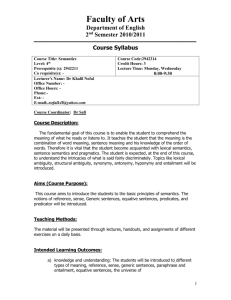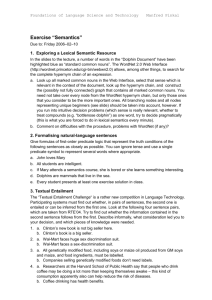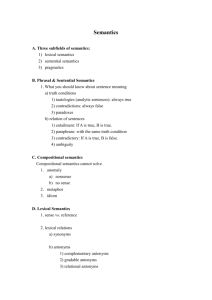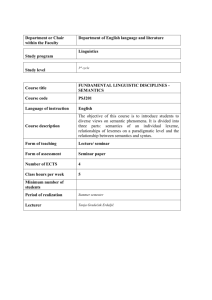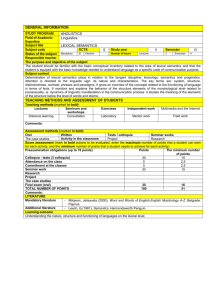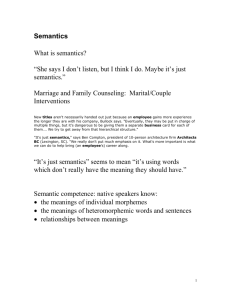Semantics06
advertisement
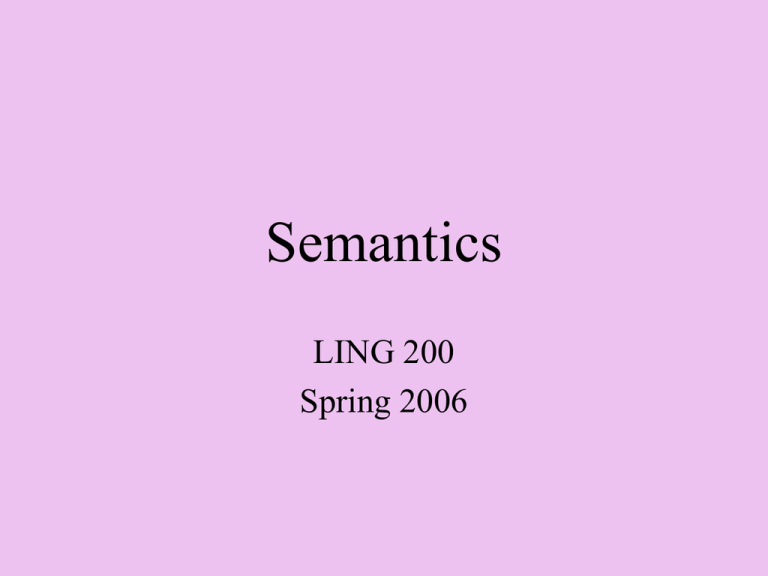
Semantics LING 200 Spring 2006 Overview • Semantic competence • Lexical semantics – Some meaning relationships – Cross-linguistic variation • Reference – iconicity – protypes – sense vs. reference • “semantics” • Phrasal semantics Semantic competence • Semantics – overlaps with morphology, syntax – an important part of linguistics • What native speakers know about: – meanings of individual morphemes – meanings of heteromorphemic words and sentences – relationships between meanings • Challenge of studying semantics – knowing what morphemes, words and sentences mean Lexical semantics • = meanings of morphemes (and words) • Some meaning relations – – – – Synonymy Ambiguity Antonymy Hyponymy and hypernymy Synonymy • If A is synonymous with B, – A and B mean the same thing, A can be paraphrased by B • (Fairly) synonymous lexical items – – – – couch = sofa get = receive throw up = vomit put off = postpone • cf. procrastinate (‘put off due to laziness’) Ambiguity • Polysemy vs. homophony • Polysemous morpheme – meaning1 – e.g. hard meaning2 • “durable, solid” • “difficult” • Single lexical entry in a dictionary Homophony • Homophones – morpheme1 morpheme2 meaning1 meaning2 – e.g. pass (‘I’m going to pass’) • ‘abstain’ • ‘succeed’ • Distinct lexical entries in a dictionary Hyponymy and hypernymy • If B is a hyponym of A, then – the meaning of B is a special case of A • If A is a hypernym of B, then – the meaning of A is a more general instance of B B A Hyponyms: nouns Hyponymy: adjectives colored (‘contains color’) red green black purple blue yellow turquoise royal blue Hyponymy: verbs hyponym hypernym dance move slice cut drive motate Fromkin, Rodman and Hyams (p. 184): ‘clarinet, guitar, horn, marimba, piano, trumpet, and violin are hyponyms because they are “musical instruments” but there isn’t a single word meaning “musical instrument” that has these words as its hyponyms.’ Still, piano is a hyponym of musical instrument; etc. (Generally) productive ways of forming hyponyms strategy adjectival/ sentential modification hyponym car flower compounding pickle rage adverbial modification interesting Japanese car the flower I picked last night dill pickle road rage incredibly interesting Caveats re adjectival modification • Anti-intersection adjectives is not a hyponym of: fake $100 bill $100 bill the former president the president (i.e. current) phony offer offer phony offer offer • ‘Non-intersection’ adjectives is not necessarily a hyponym of: possible solution solution alleged thief thief thief alleged thief alleged thief ?? ?? Caveat re compounding • “Exocentric” compounds boombox is not a hyponym of: instead hyponym of: box sound system station wagon wagon car soap opera TV show opera Cross-linguistic variation in lexical semantics 1. How many morphemes are required to express a concept? – ‘conifer branch’ • English: 2 morphemes • Witsuwit’en – 1 morpheme: [?l] ‘branch of conifer’ – cf. -[jischm] ‘branch of deciduous tree’ 2. How general is the concept expressed by a morpheme? (How many semantic features does it take to describe the concept?) How are concepts morphologically encoded? • Witsuwit’en – [tstl’s] ‘paper, letter, book’ – [nxw]- ‘our, your (pl.)’, [nj]- ‘your (sg.)’ Cross-linguistic variation in the encoding of kinship concepts • e.g. ‘parent’s sibling’ – Other possible concepts that might also be encoded in a single morpheme: • sex: not specified, male, female • side of family: not specified, maternal, paternal • 3 x 3 = 9 possible distinct concepts (in addition to ‘parent’s sibling’) ‘parent’s sibling’ sex of parent’s sibling side of family 1 not specified not specified 2 not specified maternal 3 not specified paternal 4 female not specified 5 female maternal 6 female paternal 7 male not specified 8 male maternal 9 male paternal English Witsuwit’en Sahaptin 1 ‘parent’s sibling’ -- -- -- 2 ‘mother’s sibling -- -- -- 3 ‘father’s sibling’ -- -- -- 4 ‘parent’s sister’ aunt -- -- 5 ‘mother’s sister’ -- -aq’j/-eq’j paXáX 6 ‘father’s sister’ -- -pits pišíš 7 ‘parent’s brother’ uncle -- -- 8 ‘mother’s brother’ -- -z?E káka 9 ‘father’s brother’ -- -thaj mXa Reference • Iconic vs. non-iconic reference • Does the form of a sign (expression) resemble what it refers to? – spoken languages, rarely – sign languages, more often Iconic vs. non-iconic reference BANANA ENGLAND Prototypical reference • For many common nouns, the set of possible referents are clustered around a prototype. • E.g. ‘bird’ • Prototypical exemplars of a category are more readily (quickly, reliably) processed than atypical exemplars. Reference and prototypes • Prototypes vs. set of possible referents: – some set overlap possible: • ‘bowl’ vs. ‘cup’ Reference and prototypes • ‘a few’ • ‘blue’ vs. vs. ‘several’ ‘green’ Coreference • Grammatical encoding of reference – syntax overlaps with semantics • Pronoun form. Reflexive pronouns: singular plural 1 myself ourselves 2 yourself yourselves 3 himself, herself, itself themselves Coreference • Joyce burped. Julia asked if Joyce could excuse herself. • Julia burped. Julia asked if Joyce could excuse her. ‘herself’ must be coreferential with another NP in the same sentence ‘her’ must not be coreferential with another NP in the same sentence Sense vs. reference --‘What does [hawláak] mean?’ --‘Let’s ask Virginia Beavert.’ vs. ‘Let’s ask someone who speaks Sahaptin.’ Sense vs. reference • Reference (‘extension’): identity of real world object • Sense (‘intension’): (compositionally determined) meaning • Same referent, unequal sense – ‘Toshiyuki Ogihara’ • has no sense (to an English speaker, other than “Japanese name”) – ‘the semanticist on the faculty in the Dept. of Linguistics, UW’ – Proper names characteristically have a referent but no sense Sense vs. reference • Sense without reference is possible – ‘the first female president of the United States’ – ‘the B wing elevator in Padelford Hall’ “Semantics” • To non-linguist native speakers of English, if two expressions differ in “semantics”, the expressions have the same referent but differ in sense (as pointed out to me by Prof. Ogihara) – "One of my pet peeves is when people say the school district, instead of our school district. Maybe it's just semantics, but it makes the community sound powerless, and we're not." Russ Wood, president of the Mountain ViewWhisman School Board (example from the internet) The Seattle Times, 11-1-2005 Sentence (phrasal) semantics • How do the meanings of lexical items combine? – Metonyms, metaphor – Compositionality and lack thereof (idioms) – Anomaly • Entailment Metonyms and metaphor • Metonym: ‘substitutes for the object that is meant, the name of an attribute or concept associated with that object.’ (Fromkin, Rodman and Hyams p. 184) – redcoat: ‘a British soldier in a uniform with a red coat, as during the American Revolution’ (New World Dict. of the Amer. Lg.) – soap opera: ‘a daytime radio or television serial drama of a highly melodramatic, sentimental nature: so called since many original sponsors were soap companies’ (New World Dict. of the Amer. Lg.) – redneck: ‘Exceptions [to lexical category predictability] are compounds like redneck, which is a type of person not a type of neck. Their meaning cannot be predicted by rule.’ (Fromkin, Rodman and Hyams p. 184) • [Slang] a poor, white, rural resident of the South: often, a somewhat derogatory term [from the characteristic sunburned neck acquired in the fields by farm laborers] (New World Dict. of the Amer. Lg.) • redneck a metonym; meaning not entirely predictable by rule Metaphor • ‘an expression that ordinarily designates one concept---its literal meaning---but is used to designate another concept, thus creating an implicit comparison.’ – ‘Float like a butterfly, sting like a bee.’ Idioms/proverbs • Institutionalized metaphors – When does a metaphor become so widespread as to become an idiom? • Have two (or more) meanings – literal (compositional) meaning – figurative (noncompositional) meaning, a.k.a. ‘free translation’ Some English idioms and proverbs idiom phrasal category noncompositional meaning to put one’s foot VP in one’s mouth ‘to say something stupid, regrettable and/or insensitive’ to split hairs VP to get religion VP ‘to insist on minute, possibly unimportant detail’ ‘to become zealously convinced (about something)’ dead end NP ‘termination of street with no connection to another street’ black market NP ‘illegal trading or exchange’ fair winds and following seas NP ‘an easy, straightforward time with future endeavors’ dead in the water AP ‘not going to happen/come to fruition’ Let sleeping dogs S lie. ‘Don’t ask questions/raise issues that could create more problems than would be solved by the original question.’ Some Tsek’ene idioms idiom [tche? nikl] phrasal category literal meaning noncompositional meaning VP ‘it wagged its tail’ ‘he/she/it died’ ‘he/she put my head in the water’ ‘frog hand’ ‘he/she criticized me’ [thìtshìsIni?õ] VP [thehkhahče ilà?] NP ‘slow, clumsy hands’ Some Witsuwit’en idioms idiom [jX ste] [njzil util?j?] phrasal literal category meaning ‘he/she stays VP home’ VP [c’t’xwts’j NP il] [ljap t?at S p jininje] noncompositional meaning ‘she is pregnant’ ‘he/she/it likes ‘he/she/it is used to you’ your smell’ ‘songbird backpack’ ‘large wet snowflake’ ‘the devil fought with his wife’ ‘there was a hail storm’ Anomaly • Semantically ill-formed phrases – meanings that cannot combine with each other – anomalous expression = ‘oxymoron’ • Sign in a London department store: Bargain basement upstairs • On a church door: 'This is the gate of Heaven. Enter Ye all by this door.' (This door is kept locked because of the draught. Please use side door.) • Outside a disco: Smarts is the most exclusive disco in town. Everyone welcome. – source of many of Jay Leno’s “Headlines” • Semantic well-formedness independent of syntactic well-formedness – #Colorless green ideas sleep furiously. • # = semantically ill-formed – Jabberwocky (see p. 202 of Fromkin, Rodman and Hyams) Entailment • If X entails Y, then whenever X is true Y is also true. – X: Last night I did the dishes and straightened the living room. entails: • Y: Last night I did the dishes. – X: A contestant was fired by Donald Trump. entails: • Y: Someone was fired by Donald Trump. Entailment • Mutual entailment = complete synonymy • ‘Put off’ is synonymous with ‘postpone’ – If – They put off the wedding until June. entails – They postponed the wedding until June. and – They postponed the wedding until June. entails – They put off the wedding until June. – Then – They postponed the wedding until June. is synonymous with – They put off the wedding until June. Predicting entailment 1. Factive verbs: be sorry, regret, stop Factive verbs entail the truth of their complements. • I’m sorry that the Seahawks lost. entails • The Seahawks lost. • I regret that I put my foot in my mouth. entails • I put my foot in my mouth. • When did you stop beating your ___? entails • You were beating your ___. • Complements of factive verbs cannot be ‘cancelled’ – Julia is sorry the party is over (#but it’s actually still in full swing). • Complements of non-factive verbs can be cancelled – Julia said the party is over (but it’s actually still in full swing). – Julia thinks the party is over (but it’s actually still in full swing). Predicting entailment 2. Dictum de Omni If sentences X and Y differ only in that X contains a hyponym (special case) of Y, then X generally entails Y. Dictum de Omni dill pickle is a hyponym of pickle X: Dave ate a dill pickle. entails Y: Dave ate a pickle. Japanese car is a hyponym of car X: Prof. Ogihara bought a Japanese car. entails Y: Prof. Ogihara bought a car. Predicting entailment 3. Dictum de nullo If sentences X and Y differ only in that X contains a hypernym (general case) found in Y, then X generally entails Y. And the sentences containing X and Y are (any of) – Negative sentences – Conditional sentences – Sentences containing ‘all’, ‘every’; habitual sentences Negative sentences • Seattle is a hypernym of Ballard • X: ‘Bill Gates doesn't live in Seattle.’ entails • Y: ‘Bill Gates doesn't live in Ballard.’ Conditional sentences • sports car is a hypernym of German sports car • X: If Bill bought a sports car, then it must be a nice car. entails • Y: If Bill bought a German sports car, then it must be a nice car. Sentences with 'every' • boxing match is a hypernym of celebrity boxing match • X: Darva Conger watched every boxing match. entails • Y: Darva Conger watched every celebrity boxing match. Habitual sentences • boxing is a hypernym of celebrity boxing • X: Darva Conger enjoys boxing. entails • Y: Darva Conger enjoys celebrity boxing. Entailment summary • Possible to predict when some sentences entail other sentences. • Depends on – whether sentence contains a factive verb or not – which sentence contains hypernym vs. hyponym – type of sentence • positive • negative, conditional, ‘every’, habitual Semantics summary • Semantics overlaps with morphology, syntax • Semantic competence • Lexical semantics – Cross-linguistic variation in the number of morphemes to encode concepts – Semantic relations: antonymy, synonymy, ambiguity, hyponymy, entailment • Reference, coreference, reference vs. sense, “semantics” • There are both compositional and noncompositional aspects of linguistic meaning • Entailment
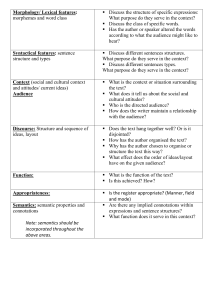
![2 Meaning[1]](http://s3.studylib.net/store/data/009749903_1-6a50d932662097cf54d6087a0fbfce74-300x300.png)
